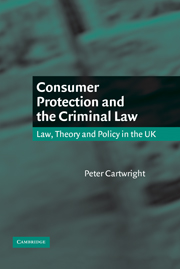Book contents
- Frontmatter
- Contents
- Preface
- Acknowledgements
- List of abbreviations
- 1 Consumer protection rationales
- 2 Techniques of regulation
- 3 The role of criminal sanctions in consumer protection
- 4 The use of the criminal law
- 5 Consumers and safety: the protection of physical integrity
- 6 The protection of economic interests
- 7 The enforcement of regulatory consumer law
- 8 Conclusions
- Index
6 - The protection of economic interests
Published online by Cambridge University Press: 24 June 2009
- Frontmatter
- Contents
- Preface
- Acknowledgements
- List of abbreviations
- 1 Consumer protection rationales
- 2 Techniques of regulation
- 3 The role of criminal sanctions in consumer protection
- 4 The use of the criminal law
- 5 Consumers and safety: the protection of physical integrity
- 6 The protection of economic interests
- 7 The enforcement of regulatory consumer law
- 8 Conclusions
- Index
Summary
Introduction
It was argued in the previous chapter that the criminal law has an important role to play in the protection of a consumer's safety. Indeed, research by Braithwaite suggests that regulatory offences which protect safety are viewed by the public as being as serious as violent crimes. There may be debate about the extent to which producers should be strictly liable, either under the law of tort or the criminal law, but the need to ensure that unsafe products are controlled is generally seen to justify a tough stance from the state. It is more difficult to establish the role that the criminal law should play in the protection of consumers' economic interests, although it should be noted that there will be overlap between safety and economic interests in a number of ways. A victim of a dangerous product may be primarily concerned with the economic loss suffered as a result of missing work or undergoing treatment. Adulterated food will be tackled by the criminal law regardless of whether the adulteration makes it dangerous, or merely different from what the consumer intended. It is also possible to bring an action under a statute aimed at protecting economic interests such as the Trade Descriptions Act 1968 where the product is dangerous.
The importance of economic interests has been recognised at both national and international level. Statutes such as the Trade Descriptions Act 1968 are aimed primarily at removing false or misleading information.
- Type
- Chapter
- Information
- Consumer Protection and the Criminal LawLaw, Theory, and Policy in the UK, pp. 156 - 211Publisher: Cambridge University PressPrint publication year: 2001



